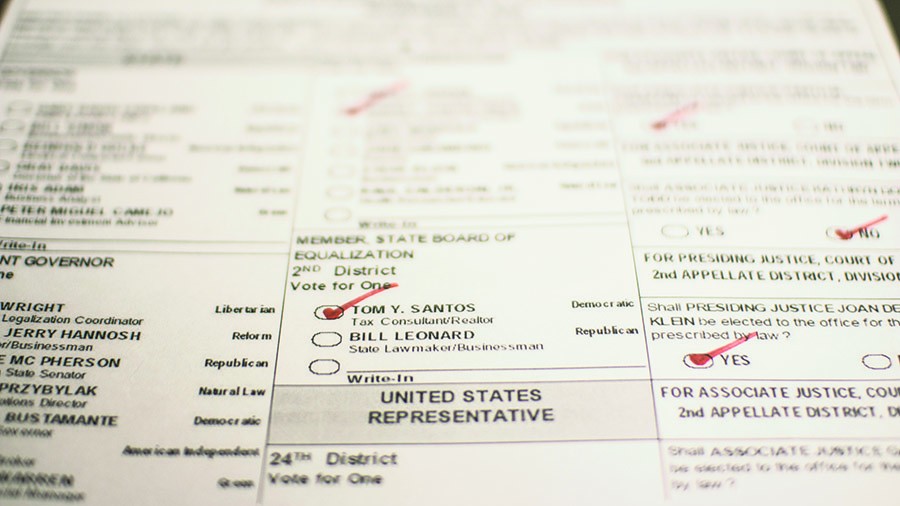Change tomorrow. Vote today.
Reaching out to a demographic of disinterested voters.
March 7, 2016
If you’re reading this and are between the ages of 18 and 24, chances are you won’t vote in the upcoming presidential election.
This is the standard society has come to expect from disinterested young adults, a standard that has unfortunately been perpetuated in the past 50 years.
According to data published by the Census Bureau, voter turnout for college-aged adults during presidential elections has been on a steady decline since 1964. With the exception of some scattered peaks during the Clinton and Obama campaigns, adults ranging from 18 to 24 simply couldn’t be bothered to vote.
The study reveals that those within the age range of traditional college students have always had the lowest voter turnout amongst three other age demographics (25-44, 45-64, 65+).
Through the findings of the Census Bureau’s review, it was reported that the voting rates for 18 to 24-year-olds has dropped from 50.9 percent in 1964 to 38 percent during the most recent presidential election in 2012.
In 2008, the voting rates for the same demographic were just shy of 47 percent during Obama’s initial presidential run, but this number comparatively plummeted in the following election four years later.
Why is this information troubling? Because it is so damning to entire generations of 20-somethings.
The generalization that young adults make in regards to the U.S. interpretation of democracy hinges on the idea that their vote doesn’t count. When arguing voter relevance, 18 to 24-year-olds have a tendency to suggest their vote fundamentally “doesn’t matter” or that it will be “cancelled out” by someone else’s vote. Factually, there is a resounding falsehood to each of these claims.
Take a moment to consider the results from this past Iowa caucus.
On the Democratic side, the resulting percentages indicating who won were so close that decimal points were used to express who the victor was between former Secretary of State Hillary Clinton and Sen. Bernie Sanders (I-Vt.).
After hours of closely counting the votes by hand, it was reported that Clinton finished ahead of Sanders by .3 percent. This translates to Hillary Clinton winning over 700.47 state delegates and Bernie Sanders 696.92, meaning that Clinton’s victory literally came about thanks to a handful of votes, or people that could be bothered to vote.
Voting does matter, and any suggestion otherwise is a severe misinterpretation of government.
Change, whether it be in regards to social or economic issues, doesn’t just come about thanks to the decision of one person; instead, change happens thanks to the contributions and opinions of many. A fragmented system cannot be corrected by perpetual discourse and protesting (although, each of those things do help).
For any wrongs to be made right within government, ideas and concepts first need to be passed. How do these changes come about and eventually move down the pipeline? Through the process of making your voice not only heard, but also understood. This is why voting is arguably the most important civic duty of a United States citizen.
Implying that voting doesn’t matter and electing to not care about the political system is conceptually flawed. Choosing to not have a voice through polling is essentially something that boils down to relinquishing control of potential benefits for not only yourself, but your peers as well.
In Florida’s 2014 gubernatorial race, the Democratic candidate, Charlie Crist, was beaten by the Republican incumbent, Rick Scott. What makes this defeat so relevant is that, per the Tampa Bay Times, there was only a one percent margin of victory, a gap that translates to roughly 66,000 votes.
In a related article, Mother Jones pointed out that if Crist had won the election nearly 700,000 residents of Florida previously without health insurance would have received aid thanks to the ObamaCare Medicaid expansion, something the elected governor Scott refused to do.
The assumption that voters may not have a great impact within a democracy centric system is perpetuated when potential young voters reconsider the relevance of their support. Some presidential candidates, Sanders being one of them, not only acknowledge younger voters have a lot of insight to offer, but also recognize there is a powerful punch synonymous with youthful backing.
During past presidential elections, 18 to 24-year-old voters have shown up primarily when there is a candidate who appeals to them; sure, this is a good thing. However, this is also a problem because young adult voters need to begin expressing the same enthusiasm every four years no matter who the candidate is – their excitement for change could be what ultimately reshapes the world they will one day live in.












